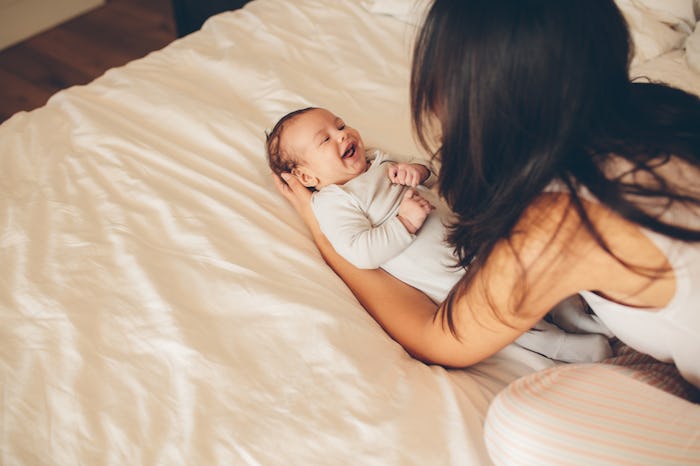That moment when you see a baby look up and make eye contact with you can be captivating. There's so much wonder in those little eyes. But have you ever wondered what babies see when they look at you? Babies can most certainly distinguish faces, but, as a recent study has found, standing in a certain position could help your baby recognize you more easily. In fact, according to the research, standing to the left of your baby best enables them to realize just who they're looking at.
The study, conducted by the French National Center for Scientific Research, the French National Institute of Health and Medical Research and the French Alternative Energies and Atomic Energy Commission, examined babies from 1 to 6 months old to uncover how they perceive faces. Jessica Dubois, one of the lead researchers, explained to Euronews why face recognition is so important to development:
Faces are one of the most frequent stimuli that babies are looking at, so it’s very important for developing many abilities, such as social communication.
Dubois and her team also uncovered something interesting about the similarities between adult and infant brains and their relative brain lateralization. Brain lateralization is when people use one side of the brain to process certain information. So, when it comes to facial recognition, both adults and babies tend to use the right side of their brains, according to Euronews. And as a general rule, what is seen by one side of the visual field is processed by the opposite side of the brain.
So, according to the research, when babies see someone to their left, they are more easily able to recognize that person by using the right side of their brains. However, when the opposite was tested and babies looked at people to their right, they were not as capable of recognition. Researchers explained the difference in capability as a still-developing ability to transfer information from one side to the other, as adults would do when they see someone to their right.
Dubois told Euronews that the findings show how developed the human brain is, even at such a young age, saying:
Sometimes, you have this feeling that a baby is not able to do things. But, it can already do a lot of things at the behavioral level since at this early stage you already have high specialization like the adult brain.
In fact, babies are capable of recognizing parents' faces as early as within a week after birth, according to Parents. This is likely due to their complete dependence on parental care. In fact, 6-month-old babies are more adept at picking out individual faces in a group of people than adults are. However, that ability begins to lessen around 9 months of age. But it doesn't have to, as Olivier Pascalis, Ph.D., a researcher at Université Pierre Mendès France, in Grenoble to Parents. Pascalis believes that exposure to faces from a diverse pool of individuals could potentially "extend the ability into adulthood," according to the publication.
Faces are also the first things that babies recognize, long before they begin to pick out other objects. Researchers at Stanford found that there is a reason why babies stare at faces longer than any other image, while they struggle to differentiate between basic shapes. This is because they develop that specific recognition early on and rely on faces more than any other, according to the Stanford research.
All of this highly technical knowledge may not appear to have much relevance in parents' daily lives, but any information on how the brains inside of those adorable little heads work is welcome. Uncovering how infant brain development works plays an important role in developmental psychology as a whole. So for those of us not in the psych world, maybe stand a little to the left when communicating with your little ones. Just to see what happens.
Check out Romper's new video series, Romper's Doula Diaries:
Watch full episodes of Romper's Doula Diaries on Facebook Watch.
